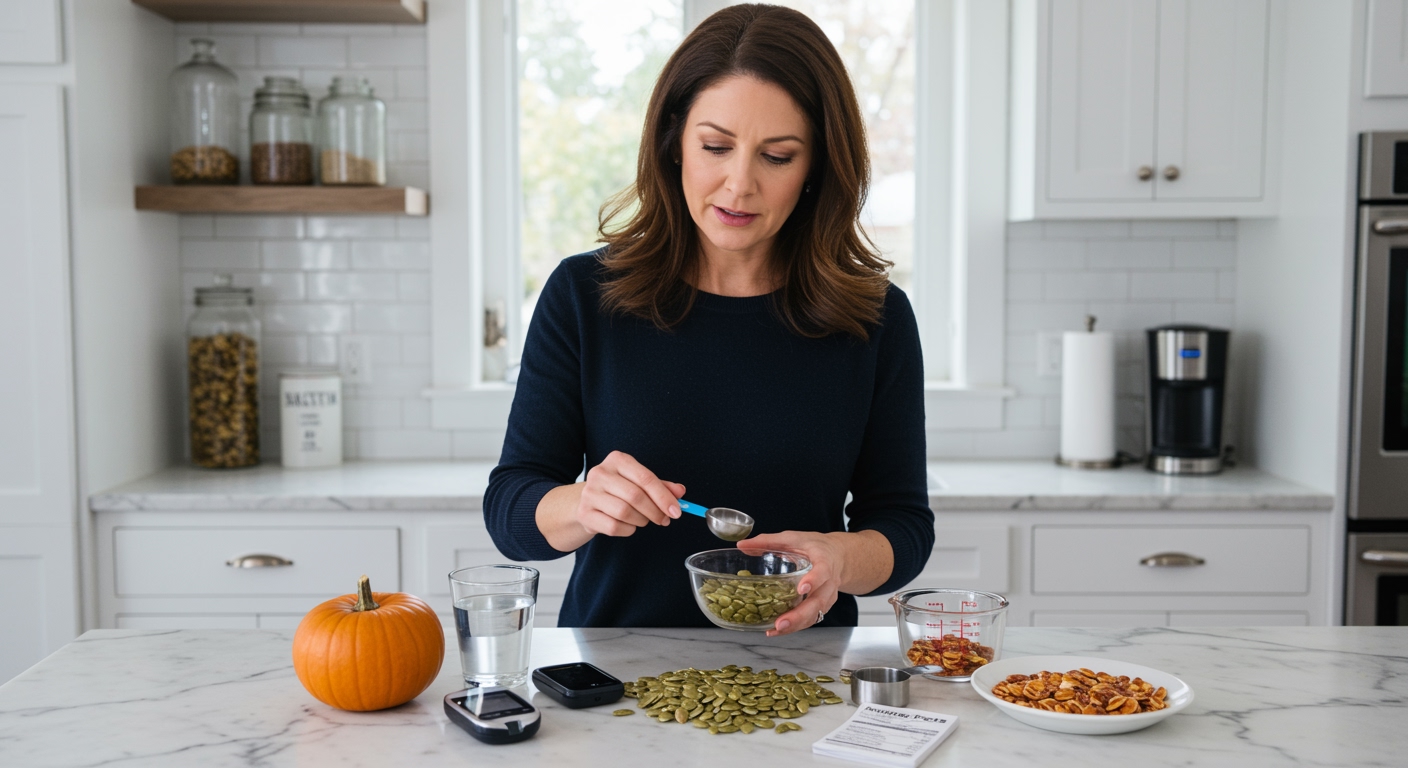✪ Key Takeaway: Pumpkin seeds are safe for diabetes with low glycemic index and blood sugar benefits when eaten in proper portions.
Introduction
Your doctor tells you to watch your carbs, but nobody mentions what to do about those delicious pumpkin seeds sitting in your pantry.
You might be wondering if these crunchy seeds will send your blood sugar through the roof or if they can actually help manage your diabetes.
Hi, I am Abdur, your nutrition coach, and today I am going to explain exactly how pumpkin seeds affect your blood sugar and whether they belong in your diabetes meal plan.
What Makes Pumpkin Seeds Diabetes-Friendly?
Pumpkin seeds have a glycemic index of just 10 to 15, which puts them in the low category that barely affects blood sugar.
This low glycemic response happens because pumpkin seeds contain mostly healthy fats and protein rather than simple carbohydrates.
A one-ounce serving of pumpkin seeds contains only 5 grams of carbohydrates, with 1.7 grams coming from fiber that actually helps slow sugar absorption.
The remaining 3.3 grams of net carbs create minimal impact on your glucose levels compared to other snack foods.
Research shows that the magnesium in pumpkin seeds can improve insulin sensitivity, which means your body uses insulin more effectively.
The healthy fats in these seeds also help stabilize blood sugar by slowing down the digestion process and preventing rapid glucose spikes.
✪ Fact: One ounce of pumpkin seeds provides 37% of your daily magnesium needs for better insulin function.
How Much Can You Safely Eat?
The ideal portion size for pumpkin seeds is one ounce or about 28 grams, which equals roughly two tablespoons.
This portion provides excellent nutrition without overwhelming your daily carb budget or calorie intake.
Eating more than one ounce can add up quickly since pumpkin seeds are calorie-dense at 151 calories per ounce.
Your body needs time to process the fats and protein, so spreading your intake throughout the day works better than eating large amounts at once.
If you are following a strict carb-counting plan, remember that one ounce counts as about 3 grams of net carbs toward your daily total.
Monitor your blood sugar response when you first add pumpkin seeds to see how your body reacts, as individual responses can vary slightly.
✪ Pro Tip: Use a small measuring cup to portion your seeds instead of eating straight from the bag.
When Should You Eat Pumpkin Seeds?
The best time to eat pumpkin seeds is as a mid-morning or afternoon snack when your blood sugar tends to dip naturally.
Eating them between meals helps maintain steady glucose levels and prevents the hunger that leads to poor food choices.
You can also include pumpkin seeds with your breakfast to add protein and healthy fats that slow down carb absorption from other foods.
Avoid eating pumpkin seeds late at night since the high fat content takes more energy to digest and might affect your sleep quality.
If you take diabetes medications, eating pumpkin seeds with your regular meal timing helps maintain your medication schedule effectiveness.
The fiber and protein in pumpkin seeds work best when combined with your existing meal plan rather than as isolated snacks.
✪ Note: Pair pumpkin seeds with a small apple for a balanced snack that provides both quick and sustained energy.
What About Raw Versus Roasted Seeds?
Raw pumpkin seeds contain slightly more nutrients since heat processing can reduce some vitamin content during roasting.
However, roasted seeds are easier to digest and have better flavor, which makes them more likely to become a regular part of your diet.
The glycemic impact remains virtually the same whether you choose raw or roasted varieties, so personal preference should guide your choice.
Store-bought roasted seeds often contain added salt or oils that increase sodium and calories, so check the ingredient list carefully.
Making your own roasted seeds at home lets you control the salt content and avoid unnecessary additives that might affect your blood pressure.
Both raw and roasted seeds provide the same blood sugar benefits, so focus on choosing the option you will actually eat consistently.
✪ Pro Tip: Roast your own seeds with just a pinch of sea salt and herbs for maximum flavor control.
The Bottom Line
Pumpkin seeds are not only safe for diabetes but can actually support better blood sugar management when eaten in appropriate portions.
The best nutrition advice is the one you can follow consistently, and pumpkin seeds make that easier with their convenience and health benefits.
I would love to hear about your experience with pumpkin seeds or any questions you have about incorporating them into your diabetes meal plan, so please share your thoughts in the comments below.
References
At NutritionCrown, we use quality and credible sources to ensure our content is accurate and trustworthy. Below are the sources referenced in creating this article:
- PMC: Nutritional and Health Benefits of Pumpkin Seeds
- Glycemic Index Net: Pumpkin Seeds Glycemic Index
- PubMed: Magnesium and Insulin Sensitivity
- January AI: Pumpkin Seeds Glycemic Response





